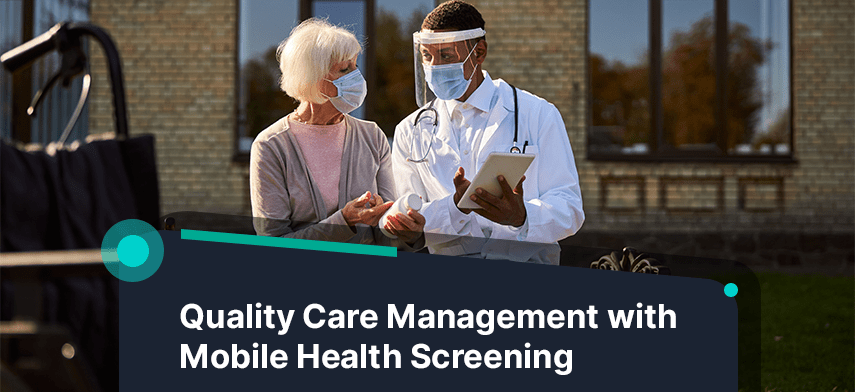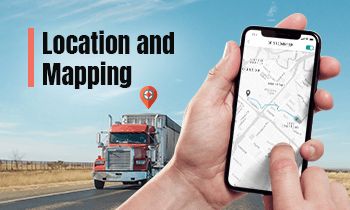The COVID pandemic has been harrowing especially for the vulnerable communities pushing them towards exposure to the virus. There is the negligence of proper infrastructure present to meet the daily needs of the vulnerable communities at a low cost. This forces them to go without adequate access to testing centers which can help prevent the spread of the virus.

In such a situation, mobile health screening centers are cropping up to help combat this issue. Governments are coming up with schemes to create such centers worldwide. This is helping to cope with the geographical and economic barriers that hinder vulnerable communities from accessing testing centers.
Access to Mobile Health Units/Clinics for Vulnerable Communities
Some of the mobile testing centers that are cropping up are relying on paper processes for covid-19 tests. However, as more centers receive more significant funding, they switch to developing fully electronic methods that use rapid cycle PDSA, which helps to improve the time it takes to process one patient in less than 10 minutes. The electronic-based screening in mobile testing centers is incorporating telemedicine to reach greater reach in these communities.
The testing centers are trying to improve their inpatient and outpatient transformation strategies. This will enable them to align the services they offer to the requirements of the vulnerable communities they are situated in.
These off-site mobile health screening Covid testing centers are created based on the population’s requirements. Mobile testing centers rely upon telemedicine and virtual care. This helps a more extensive section of these communities access proper health care without worrying about a huge medical bill. Telemedicine centers in these locations offer free assistance to covid patients.
The mobile testing centers are educating their healthcare workers to be particularly aware of the challenges of working with vulnerable communities so that quality care management can be arranged. The people working in these mobile testing centers have to be sensitized about the social determinants of health that affect these communities. Therefore, assisting in identifying the proper ways to mitigate their issues. Some of the parameters used to recognize vulnerable communities are:
- Lack of access to primary health care services
- High unemployment rates and lack of economic resources
- Cultural differences such as social and linguistic barriers
- Low literacy rates
- Environmental challenges such as unsafe streets or inaccessible roads
- Lack of health insurance
To solve these issues, trust has to be built between the health centers and the people, and the establishment of community-based leaders is also undertaken to mitigate any distrust. Such community leaders can spread the word of community-based healthcare centers, which mostly rely on prioritizing building trust to meet the needs of these communities.
Methods Used to Screen Patients for COVID-19 in Mobile Medicine Settings
As stated earlier, mobile health screening centers are using community leaders to increase the number of people who come to get tested. However, it is not always possible for vulnerable communities to physically be present.
Mobile health services are taking advantage of the information and communications technology for treatments of vulnerable communities, which can help deliver timely care. This way, the strain on the medical health experts is also reduced as they effectively check the spread of the virus in such geographical areas where the number of physicians is already less. Telemedicine and virtual care have been integrated into mobile health care treatment centers. Minimizing the important visits and reducing face-to-face contact among patients and physicians has helped lessen the transmission of the virus.
Digital transformation in healthcare in mobile health care centers has been positive as bait and maximizes the efficiency of healthcare delivery to vulnerable communities. Its success is especially noted in managing acute respiratory infections such as the Severe Acute Respiratory Syndrome and Middle East Respiratory Syndrome associated with the covid-19 virus. Physicians and patients have been educated on how telemedicine and virtual care can help them with the help of the mobile health screening centers working closely with vulnerable communities.
Using video conferencing systems, healthcare apps, virtual care integration and more allow for free video chats and other virtual platform assistance that provide telehealth services to vulnerable communities without undertaking any risks.
Some individuals are also considering using AI technology to:
- Automate the digitization of documents in these mobile health screening centers to save time.
- Going from paper-based processes to digitization has enhanced productivity, saved time and cost, which is essential in dealing with the current situations.
- One vulnerable community can get test results and healthcare information through ICT has positively increased the number of people getting tested and receiving accurate healthcare information.
The sharing of health records information through the use of digitization has been very transformative. Doctor’s prescription and monitoring of a patient’s health status can all be done at lightning speed and accuracy. Many members from vulnerable communities prefer to self-isolate, which enables a rapid recovery rate.
Drawbacks of Paper-Based Processes For Mobile Testing Centres
1 Rapid testing for a large population is restricted
In a pandemic situation, the number of people getting affected increases by leaps and bounds when proper testing is not done. In such a situation, paper-based processes create a barrier as every document is processed via handwritten documentation. Patients have to be physically present in testing centers to get treatment information and still receive errors in their reports.
2 The extreme strain on healthcare professionals
Paper-based documentation is done through people and health workers, that are declining in number every day. The minutes spent on paper-based documentation could be better utilized in treating patients in that time frame. When thousands of patients are getting tested for Covid-19, dealing with so much information and ensuring that all the documents are in order becomes highly cumbersome. Paper-based processes require patients and physicians to be in face-to-face contact, which increases the exposure of healthcare workers to more people. Therefore, increasing virus exposure and straining the overall wellbeing of healthcare frontline workers.
3 Increasing exertion on resources
Paper-based processes cost more money and vastly time-consuming as well. These two resources are of utmost importance when it comes to dealing with pandemics. The resources can be better used elsewhere rather than trying to keep the documentation of thousands of people getting tested in the mobile testing centers.

The Utility of Electronic-Based Process for Mobile Testing Centers
1 Faster processing with mobile health screening
Electronically best processes are faster, and with the technological implementation incorporated in the existing healthcare system, people are receiving enhanced healthcare information at an unimaginable pace. Documentation of patients’ information electronically is faster than any paper-based process. Thus, professionals can store or remove any information according to the requirement.
2 Enhanced reliability
Electronic-based processes like telemedicine/telehealth are incredibly affordable, and sometimes it requires a negligible amount of money. This is excellent for vulnerable communities that lack the funds to afford primary healthcare. With access to telecommunication or virtual consultation devices, vulnerable communities can connect with healthcare and medical professionals to enhance better diagnosis and prognosis when affected by the Covid-19 virus and incur insight on how one can manage these symptoms.
3 Increases efficiency and productivity of healthcare professionals
Electronic-based processes help healthcare workers manage their time and resources effectively. This way, they can reach out to vulnerable communities, who are still facing concerns with proper access to healthcare and treatment. With mobile health screening, vulnerable communities can communicate with their providers or nearby health facilities to understand the process of getting tested. This way, health and frontline professionals can work efficiently to curb the spread of the virus and reach out to the mass.
Final Thoughts,
There is a clear understanding that electronic healthcare processes for mobile testing centers are proving to be highly beneficial. When trying to understand the problems and figuring out ways to mitigate the issues, the most comprehensive solution available right now is electronically based solutions to reach out to the vulnerable communities, especially those who cannot access proper health care systems.
There should be a drive to make all mobile healthcare systems equipped to adopt electronic-based solutions to help them reach out to the population. Therefore, ensuring better community outreach programs for Covid testing centers, enhancing better health outcomes for every community.

Author's Bio

Shailendra Sinhasane (Shail) is the co-founder and CEO of Mobisoft Infotech. He has been focused on cloud solutions, mobile strategy, cross-platform development, IoT innovations and advising healthcare startups in building scalable products.


